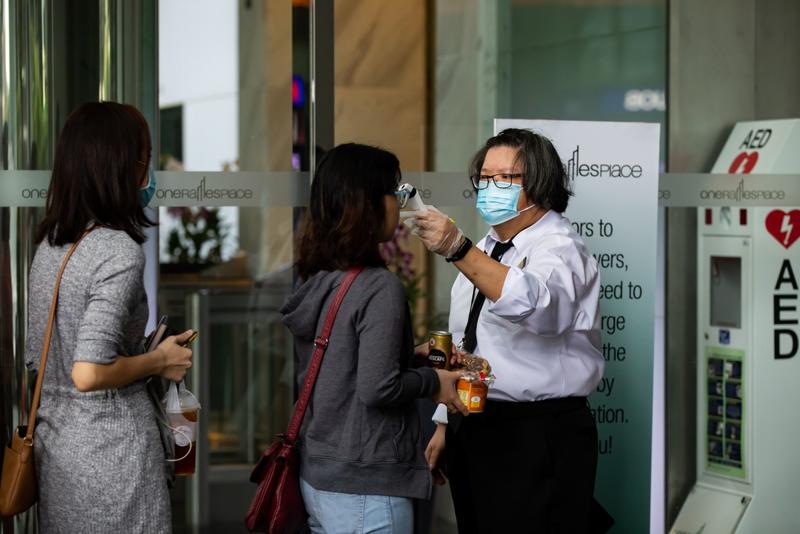 A security guard wearing a protective mask checks the temperature of a person entering an office building in the central business district of Singapore on Feb 10, 2020. (SEONGJOON CHO / BLOOMBERG)
A security guard wearing a protective mask checks the temperature of a person entering an office building in the central business district of Singapore on Feb 10, 2020. (SEONGJOON CHO / BLOOMBERG)
Singapore’s coronavirus outbreak has spread to its financial center, with some staff at major companies being told to work from home for at least the next few days and temperature screening checkpoints set up at the front doors of several towers.
A worker at an unnamed firm in Marina Bay Financial Centre Tower 1 has been confirmed as being infected with the virus over the weekend, according to a circular to tenants by the building’s manager Raffles Quay Asset Management Pte. Another case at nearby Clifford Centre, in the heart of the central business district, is an employee of United Industrial Corp, according to an advisory to tenants in the building where UIC is located.
There are 45 confirmed cases of coronavirus in Singapore, and of the total, 23 cases are locally transmitted infections, according to the city-state's health ministry
The affected premises in both buildings have been disinfected and all tenants informed, the property managers said in the notices dated Feb 9.
Singapore last week raised its disease response level to the same grade used during the SARS epidemic, as it braced for what Prime Minister Lee Hsien Loong said was a “major test for our nation”.
ALSO READ: Panic buying after Singapore raises coronavirus alert level
There are 45 confirmed cases of coronavirus in Singapore -- the largest number of infections outside China, excluding a quarantined cruise ship in Japan. Of the total, 23 cases are locally transmitted infections, according to the city-state’s health ministry. Seven people have fully recovered from the infection and been discharged from hospital, while seven are in critical condition.
The city-state has cautioned residents to avoid shaking hands in a bid to contain the spread of the virus. Panic buying had sparked a run on toilet paper, rice and instant noodles in stores, echoing scenes of long lines and bare shelves seen last week in Hong Kong and on the Chinese mainland. Government officials warned against hoarding supplies, while the Monetary Authority of Singapore told banks to be prepared for for an increased demand in cash withdrawals.
Business continuity plans
Standard Chartered Plc is the anchor tenant at Tower 1, leasing the lion’s share of the 33-story building that has 620,000 square feet. The UK bank declined to comment whether the virus case comes from among its employees.
“We have a well-established business continuity plan and implemented a comprehensive set of precautionary measures such as temperature screening, mandatory employee and visitor declarations, and increased the frequency of sanitization at our branches and office premises,” the bank said in an emailed reply to queries from Bloomberg.
ALSO READ: 3 infections linked to S'pore meet spur multinational inquiry
DBS Group Holdings Ltd, Southeast Asia’s largest bank with headquarters in the nearby MBFC Tower 3, has activated business continuity plans with employees working from home and from other locations, on top of other measures that include temperature screening on all its office buildings, the bank said in an emailed reply to questions from Bloomberg News.
Rio Tinto Group, Australia’s top iron-ore miner that’s also located in Tower 3, said that it has instructed employees to work from home from Monday through to Wednesday “as a precaution.” Its Singapore office is one of its key hubs outside of Australia.
United Overseas Bank Ltd said it has activated its business continuity plans, having staff working from split sites, from home and on split shifts. Singapore’s third-largest bank also postponed all large-scale public gatherings including customer events.
A spokesperson for Raffles Quay Asset Management said the building manager has stepped up precautionary measures at its buildings including temperature screening, more frequent cleaning in common areas and toilets, and deployment of hand sanitizers.


